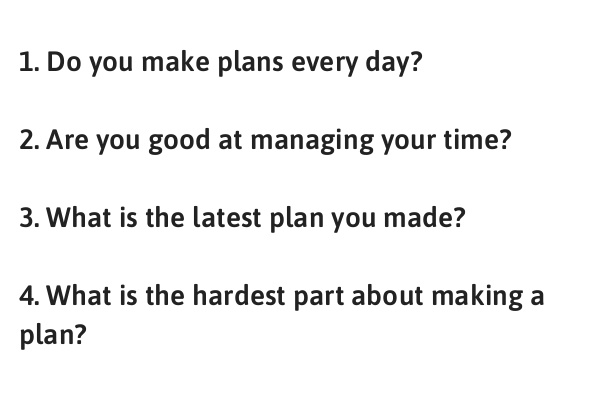Table of Contents
Plans

SAMPLE ANSWERS
1. Do you make plans every day?
Yes, I do, for many reasons.
I always carry a small notebook which I plan my daily schedule with, plans and notes. It sounds quite conventional but it works for me. Writing stuff down helps me remember tasks better than typing on some kind of productive app. I spend about 5 minutes at the beginning and end of every day to plan that day and the next day’s tasks. The important thing is you need to keep your to-do list small, it’s about prioritizing.
2. Are you good at managing your time?
Objectively speaking, I am quite good at it.
I think once you are in the habit of controlling yourself according to your time table, life becomes very easy. Good time management will help you with various other skills and competencies that graduate employers seek, from perseverance, resilience, reliability and coping with stress to problem solving and teamwork.
3. What is the latest plan you made?
Well, I’ve recently planned to travel across the country before the age of 30. I want to visit different places as much as possible to gain first-hand knowledge and experience.
Travelling fascinates me more than anything else. In reality, it would be quite challenging for me to fulfil the plan, but I will try my best to organize everything even it takes several years for me.
4. What is the hardest part about making plan?
Well, there are a lot of considerations when preparing for a plan, but I think it is establishing goals.
Establishing clear, concise and understandable goals — is extremely necessary. When people can’t see the vision of the plan, they won’t take action to pursue the plan. Clear objectives should be come up with, whereas teammates or members should also be gathered and delegated tasks appropriately, if needed.
Vocabulary

1. productive [adj]: resulting in or providing a large amount or supply of something.
Eg: He had an amazingly productiv e five years in which he managed to write four novels.
2. prioritize [v]: to decide which of a group of things are the most important so that you can deal with them first.
Eg: You must learn to prioritize your work.
3. in the habit of [expression]: if you are in the habit of doing something, you do it regularly or often.
Eg: They were in the habit of giving two or three dinner parties a month.
4. perseverance [n]: continued effort and determination
Eg: Through hard work and perseverance, he worked his way up to the top.
5. cope with [v]: deal with
Eg: It must be really hard to cope with three young children and a job.
6. first-hand [adj]: obtained personally, or directly from someone who is personally involved in something
Eg: He has firsthand experience of what war is like.
7. fascinate [v]: to interest someone a lot.
Eg: Anything to do with planes and flying fascinates him.
8. concise [adj]: expressing what needs to be said without unnecessary words; short and clear.
Eg: She wrote up a concise summary of the day’s events.
9. objective [n]: something that you plan to do or achieve.
Eg: Can the sales team achieve/meet its financial objectives?
10. delegate [v]: to give a particular job, duty, right, etc. to someone else so that they do it for you.
Eg: Authority to make financial decisions has been delegated to a special committee.


